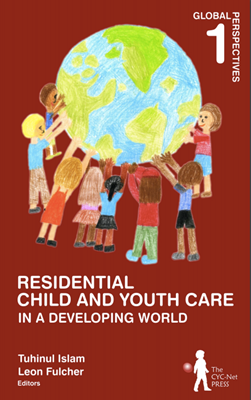Nieuw: Residential Child and Youth Care in a Developing World: Global Perspectives
ingevoerd op 20-01-2017
Residential Child and Youth Care in a Developing World: Global Perspectives (http://press.cyc-net.org/samples/Global%20Perspectives-ebook.pdf?utm_source=October-December+2016+Newsletter&utm_campaign=October-December+2016+Newsletter&utm_medium=email) is de eerste uitgave in een serie van vier waarin lokale professionals en onderzoekers reflecteren op de tradities, het beleid en de praktijk in hun land/regio met betrekking tot residentiele jeugdzorg. Er is aandacht voor 18 landen: Bangladesh, India, Cambodja, Japan, Maleisië, Jordanië, Palestina, Saudie Arabië, Ghana, Kenia, Zambia, Griekenland, Spanje, Finland, Jamaica, Caribisch gebied (Engelstalig), Argentinie en Nieuw Zeeland.
Download het boek hier (http://press.cyc-net.org/samples/Global%20Perspectives-ebook.pdf?utm_source=October-December+2016+Newsletter&utm_campaign=October-December+2016+Newsletter&utm_medium=email).
Enkele voorbeelden:
Residential Child and Youth Care in Saudi Arabia: a Case Study of Abandoned Children and Young People (http://doncel.org.ar/wp-content/uploads/2016/09/Global-Perspectives-ebook.pdf#page=155). In this chapter, the author highlights that residential care remains a popular option in Saudi Arabia for providing care for children. This chapter includes discussion of the regular approaches used in the care of abandoned children and young people born without parents.
Preparing Jamaican Children in State Care for Independent Living: A Situation Analysis (http://doncel.org.ar/wp-content/uploads/2016/09/Global-Perspectives-ebook.pdf#page=282). The challenges young people in Jamaica face as they age out of care is the focus of this chapter written by Priya Anayokar, et. al. The researchers review three Jamaican studies, which highlight challenges for young people, service providers and policy makers. The reviews found that while there are state mechanisms in place, more needs to be done to ensure these mechanisms are followed.
Institutional Care of Children and Young People in Malaysia: Searching for the Right Direction (http://doncel.org.ar/wp-content/uploads/2016/09/Global-Perspectives-ebook.pdf#page=107). Faizah Haji Mas’ud discusses the state of residential care in Malaysia. Mas’ud covers Malaysian welfare policy, types of children’s services, as well as challenges and issues Malaysia faces in providing residential care to children.
Residential Child Care in Spain: from Normalisation to Specialization (http://doncel.org.ar/wp-content/uploads/2016/09/Global-Perspectives-ebook.pdf#page=232). Jorge F. del Valle and Amaia Bravo discuss the history and state of residential child care in Spain including the transitions that occurred in the 1980s and 1990s. They also discuss types of residential care programs and qualifications of residential care staff. Del Valle and Bravo review recent literature in the area and discuss current challenges in Spanish residential care.
Institutional Care for Children in Kenya (http://doncel.org.ar/wp-content/uploads/2016/09/Global-Perspectives-ebook.pdf#page=185). Stephen Ucembe uses his personal experiences and his experiences as a social work professional to discuss institutional care in Kenya. He highlights the factors that influence the use of institutional care for children in that country, including international aid and volunteerism, as well as the negative impact of institutional care.
Child Protection and Residential Care in Greece: An Illuminative Case Study (http://doncel.org.ar/wp-content/uploads/2016/09/Global-Perspectives-ebook.pdf#page=214). This chapter from Global Perspectives is a discussion of child protection, care, welfare, and residential care in Greece. This chapter covers a brief historical overview of the child protection and care situation in Greece, as well as a discussion of care and protection of children in contemporary Greece.
 Residential Child and Youth Care in a Developing World
Residential Child and Youth Care in a Developing World